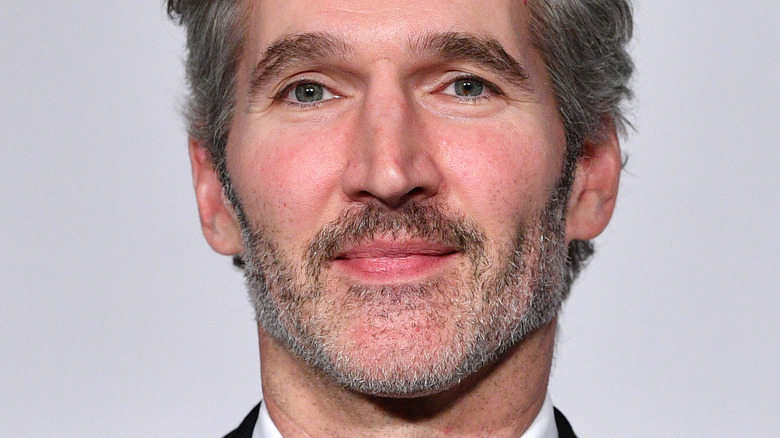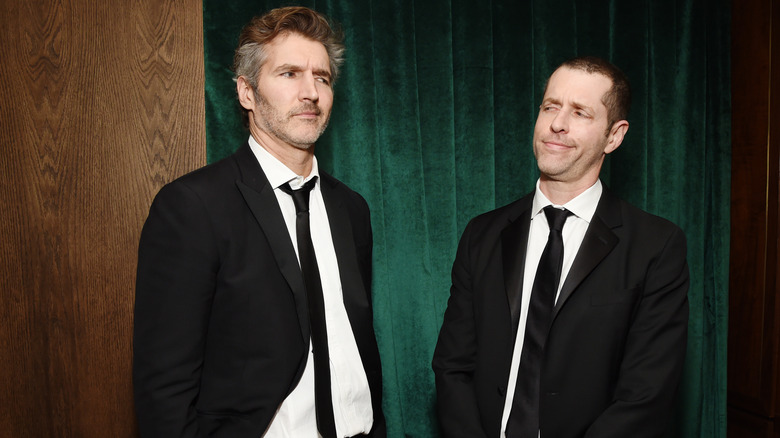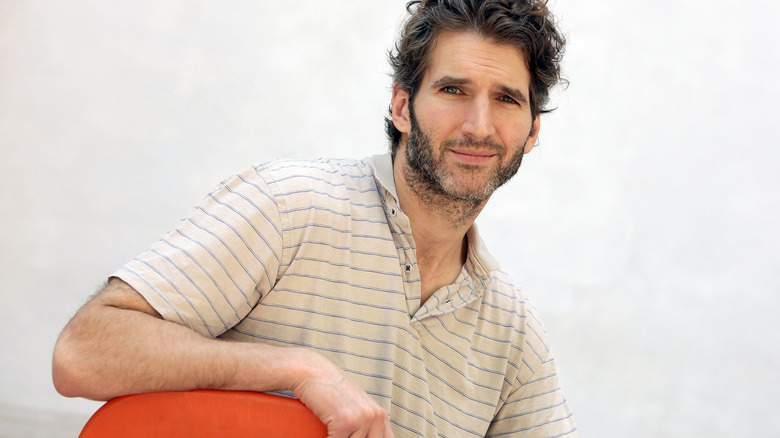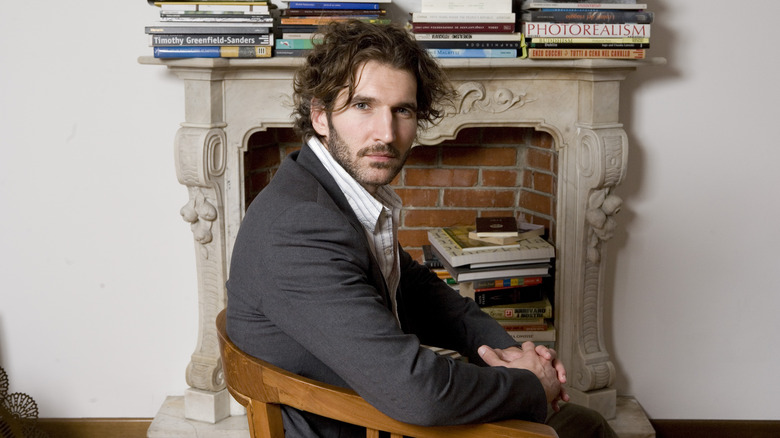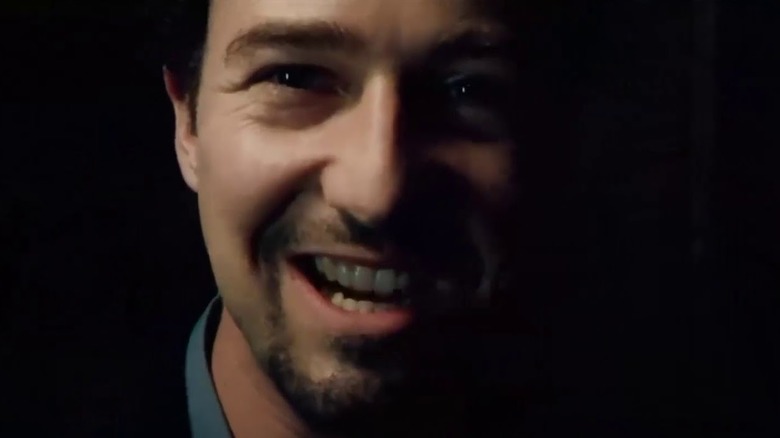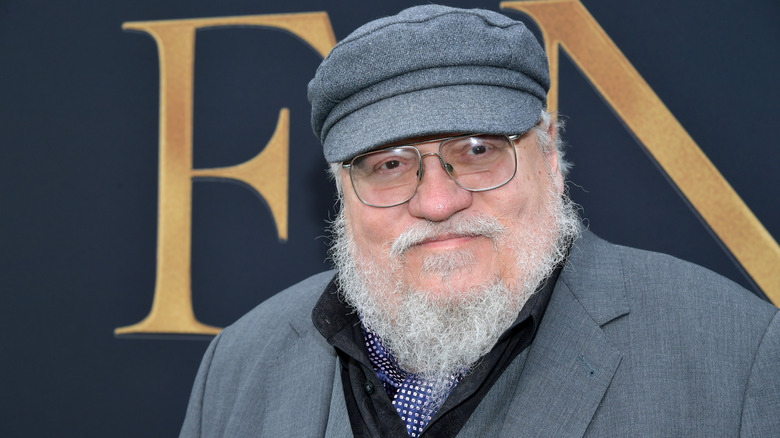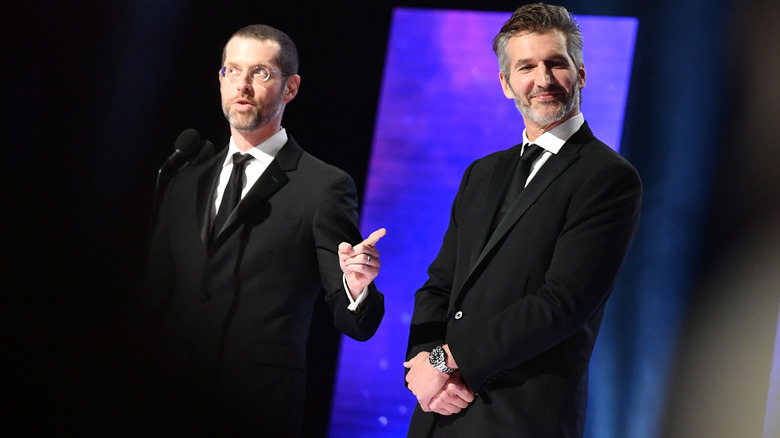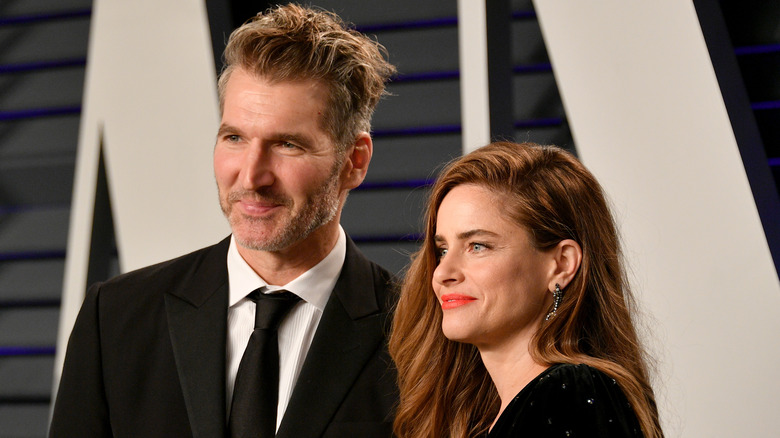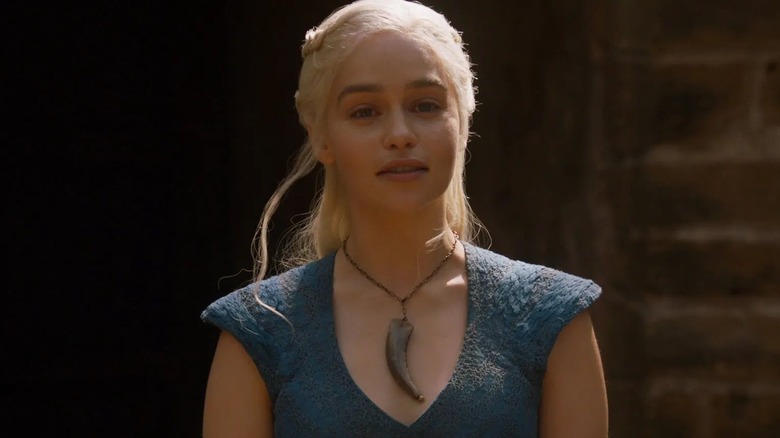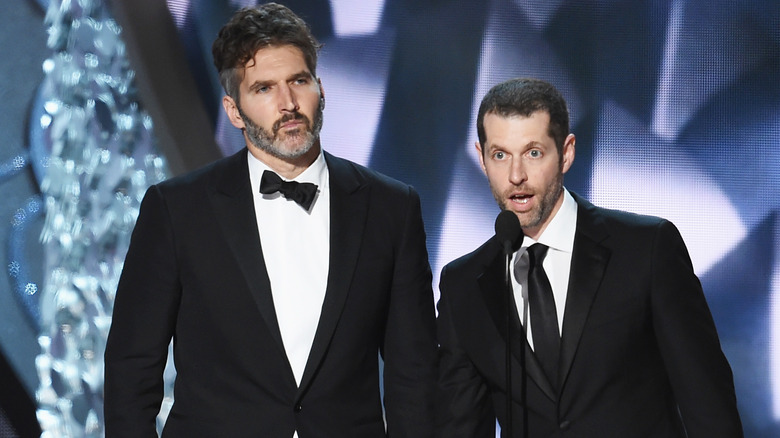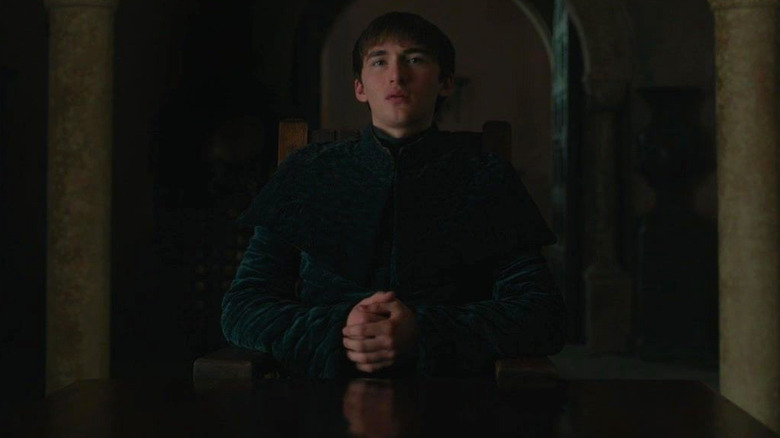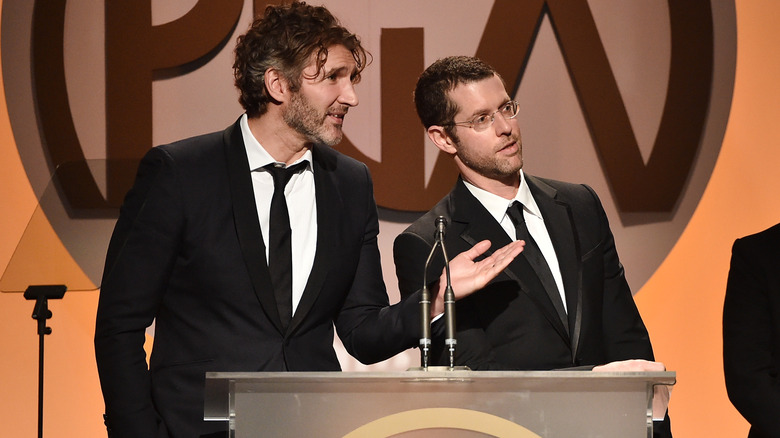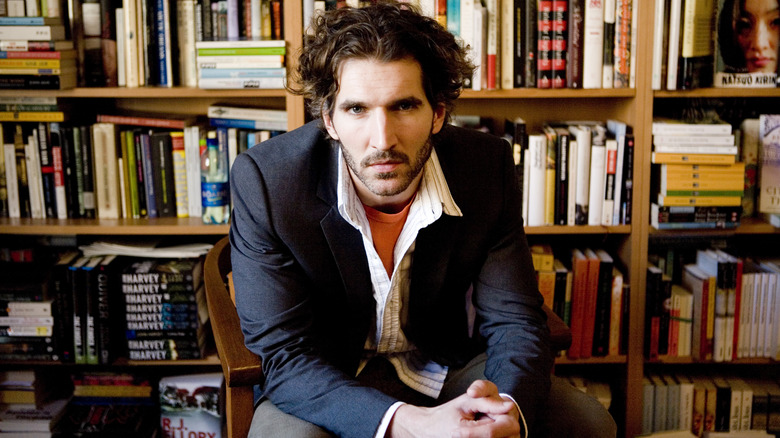The Untold Truth Of David Benioff
David Benioff is a kind of creative Swiss Army knife. With consummate skill and a gift for both pleasing crowds and enchanting critics, he's written page-turning novels and one of the biggest TV shows of all time. He can give you epic fantasy with dragons and gritty wars for a throne, or he can deliver the small-scale and deeply felt last free day of a young man about to go to prison. It's an impressive range of skills, and it's unsurprisingly opened up a lot of creative doors for him.
Whether you know him as the author of "City of Thieves" and "The 25th Hour" or one of the showrunners of HBO's "Game of Thrones," you know him as someone who can turn out relentlessly entertaining work that's worth loving and discussing. (Okay, he can also turn out the lackluster "X-Men Origins: Wolverine" or the "Game of Thrones" finale, but nobody's perfect.) His career is long, healthy, and still evolving in different directions, making this a great time to stop and consider his own personal big picture.
David Benioff's creative partnership with D.B. Weiss started in grad school
David Benioff and D.B. Weiss have a prolific, successful creative partnership, working as co-writers, co-creators, co-producers, and co-directors. One of the reasons their collaboration works so well is sheer familiarity — these two have known each other for years.
Speaking with Vanity Fair, Benioff and Weiss explained how they first met and connected when they were at Trinity College in Dublin. "We were two American Jews in Dublin," Weiss said, "with no Irish roots of any kind, obsessed with Irish literature and trying to find a functional gym in Dublin in 1995." Instead, they found each other, and they both benefited from Benioff's realization that he wanted a bigger and more emotionally invested audience for his work than he was ever going to get in academia. Weiss had a little bit of experience working in Hollywood, so Benioff hit him up for a combination of collaboration and tutoring. "I'd never written a script before," Benioff said, "and I didn't know to do it, so I asked Dan [Weiss] if he would write one with me, because he had written a bunch already. I thought I could learn it from him rather than reading a book or something."
They scrapped their first co-writing project, a horror movie where a boarding school's headmaster is really Satan, before they even sent it out. But they didn't stop working — and eventually their diligence began to pay off in spades.
He straddled the divide between Hollywood and publishing
"Game of Thrones" fans certainly know David Benioff, but booklovers knew him first. Before the groundbreaking show ever aired, Benioff had already published a short story collection called "When the Nines Roll Over" and two novels, "The 25th Hour" and "City of Thieves," which are well-crafted, intensely enjoyable, and full of emotion. It's easy to think of Benioff as someone who started as a novelist and then transitioned to TV ... but it's not exactly accurate.
In fact, Benioff worked both sides of the entertainment line well before he took on "Game of Thrones." In between novels, in addition to adapting "The 25th Hour" for the screen, he also wrote 2004's epic "Troy" and 2007's adaptation of "The Kite Runner," showing a gift for "big" projects.
He spoke with Digitally Obsessed about the pros and cons of both industries. Novels are great for the "absolute control" they offer. "You are your own boss, and the story is entirely your vision." He loves working in the movies and has a lot of fun with it, but it necessitates giving up a lot of power. As he put it, "The studio has the option of hiring another writer to rewrite, and the director has the right to interpret things the way he wants, and sometimes the actors are going to come up with their own lines." Having a dual career means he can pick and choose how much influence he wants at any given time.
In 2001, People named him one of America's Top Bachelors
David Benioff snagged one of the world's stranger professional honors right at the start of his career: People Magazine officially deemed him grade-A marriage material, naming Benioff one of "America's Top 50 Bachelors."
We have to agree that Benioff was a catch even back in 2001, before "Game of Thrones" made him a household name. His write-up in the "Top Bachelors" article spells out his charms, which range from early professional success — a terrific first novel, "The 25th Hour," with a movie adaptation already in the works — to his sweetness in choosing his long-married parents as his relationship role models. The article even gives his height — an impressive 6'3".
Of course, Benioff didn't remain on the market for long. Only a year after People sang his praises, he started dating actress Amanda Peet. They were married in 2006, an event People reported but tastefully didn't take credit for. Still, declaring Benioff tall, dark, and talented surely didn't hurt, and Benioff certainly lived up to his early promise.
His first novel got one of the best film adaptations in the business
Luck and talent combined to give David Benioff's first novel, "The 25th Hour," a near-perfect adaptation. So many things could have gone wrong, but they didn't.
The film wound up in the capable hands of Spike Lee, who knew exactly what to do with it and — in a move Benioff couldn't have anticipated — how to bring additional depth to the portrayal of New York life in an immediately post-9/11 world. In an interview with Digitally Obsessed, Benioff praised Lee's powerful evocation of this particular time and place, which was everything he could've hoped for. He felt the spirit of New York was essential to the book, and he was worried the movie setting would wind up feeling generic. "So when I found out I'd be working with Spike Lee, I was ecstatic, and it felt very surreal because there is no director who is more a New York director."
Lee was also the perfect person to balance the movie's tonal complexities, including one particular rage-fueled monologue Edward Norton's Monty delivers to himself in the mirror. Then add in a great cast — not just Norton, but also Philip Seymour Hoffman, Brian Cox, Barry Pepper, Rosario Dawson, and Anna Paquin. It all works, and it all adds up to a lasting cultural legacy, making it no surprise that Roger Ebert named it the eighth best film of the '00s and The AV Club put it in their second-place spot.
Getting the rights to Game of Thrones hinged on a trivia question
One of the best behind-the-scenes "Game of Thrones" stories is how David Benioff and D.B. Weiss got George R.R. Martin to sign off on their adaptation. In short, there was a quiz.
They met Martin for a long lunch and talked over their vision for the show, and they knew the stakes were high. Martin was shopping the books around, and their popularity was attracting interested parties who could've easily outbid and outmaneuvered this fledgling production team. "The upfront payday would have been a lot greater, if he had sold them to any one of a number of [movie] studios that wanted to buy them," Weiss told Vanity Fair. It was easy to imagine Martin point-blank rejecting the idea for a TV show over the movies. Fortunately for them, he knew the time constraints of a movie would cut his epic story to ribbons. He was open to their ideas.
First, though, he had a question: "Who's Jon Snow's real mother?" The books hadn't yet revealed the answer, but fans had certainly — and often correctly — speculated on the matter, and Benioff and Weiss were fans. "We had already discussed it," Weiss said. "We'd had like a two-hour conversation about it." Making an informed guess wasn't a problem for them at all, and their answer convinced Martin that he was putting his series in the hands of people who really knew and cared about it.
David Benioff's original Game of Thrones pilot had a big problem
In a way, "Game of Thrones" started twice, as David Benioff and D.B. Weiss had to completely re-shoot the pilot. Part of that was just about upgrading the show's visuals and realism. One of the examples Benioff gave Vanity Fair was the costumes. In the unaired version, they "looked like they'd just been made the day before." They wanted a more worn and soiled look to most of the clothes to help make the show's universe feel more real. Details like that would be enough of a reason to upgrade the pilot with a reshoot ... but they had a bigger problem.
When their informal test audience watched the original, unaired pilot, they didn't realize that Jaime and Cersei were supposed to be brother and sister. Weiss pointed out that they failed to put the necessary info on screen and accidentally expected viewers to be able to read their minds. Understanding the full, taboo-breaking scandal behind Jaime and Cersei's affair is critical to the shocking effect of the pilot's conclusion — and the key to many character motivations and plot developments. They added in some clumsy off-screen dialogue to try to correct things, and it was enough to get the show greenlit ... but it's probably good that the whole episode wound up on the cutting room floor and had to be reshot.
His Emmy acceptance speeches got fans analyzing his marriage
"Game of Thrones" inspired plenty of controversies and intense analysis over the years. Surprisingly, so did David Benioff's acceptance speeches at the Emmys — even if a lot of the hot takes were tongue-in-cheek.
So what happened? Well, he thanked his wife, Amanda Peet, which seems perfectly ordinary and expected. What baffled people, though, is that he repeatedly referred to her as "Amanda Peet," and most spouses are on more of a first-name basis with each other. Emmy viewers got on Twitter (per ET Online) to playfully give Benioff a hard time for apparently making sure everybody knew he was married to that Amanda. The Ringer broke down several theories for this seeming tic — our more outlandish favorite is that it was all an elaborate conspiracy and Amanda Peet's full name is a brainwashing trigger word (possibly to activate the Winter Soldier). Another possibility? Benioff is secretly married to multiple Amandas, so he had to specify which one he meant.
The most convincing theory The Ringer offers, however, is actually quite sweet — that Benioff simply wanted to draw attention to Peet in her own right and counter a long-standing media problem where "an extremely accomplished woman ... [is reduced] to being 'so and so's wife.'" Not on David Benioff's watch!
His director credit on Game of Thrones came down to a coin flip
How many episodes of "Game of Thrones" did David Benioff direct? It depends on who you ask.
Technically, he's only listed as the director on "Walk of Punishment" (Season 3, Episode 3) and the co-director "The Iron Throne" (Season 8, Episode 6) — but the truth is a little more complicated, and he and partner D.B. Weiss worked to streamline the complications as much as possible. Benioff told Vanity Fair that the way the Directors Guild of America handles shared credit is enough of a hassle that he and Weiss agreed to avoid it for their first two co-directed episodes. They flipped a coin for official billing, leading to Benioff getting the credit for their first episode and Weiss getting it for their second, "Two Swords" (Season 4, Episode 1). You'll only see one of them named as director for those episodes, making this further proof that you can't believe everything you see on TV.
The finale, however, was a much bigger deal to them than their directorial debuts, so they went through all the necessary effort to formally share the credit. They took their last bow together.
What he wanted from Confederate ... and why it didn't happen
"Game of Thrones" co-creators David Benioff and D.B. Weiss planned another HBO series as a follow-up, but for better or worse, it never happened. Their proposed series was a drama called "Confederate," which would take place in an alternate America where slavery continued unchecked in an unfallen Confederacy.
Benioff had high hopes for the series and for an intense collaboration with their fellow writers and executive producers, Black husband and wife team Nichelle Tramble Spellman and Malcolm Spellman, which might've helped steer the show away from its most obvious pitfalls. He liked the risk of it all and told Vulture, "It's what gets the adrenaline pumping and what gets you excited to sit down at your computer and start typing up themes and running them off the other three. And there hasn't been anything since we started on 'Thrones' that's gotten me so excited to get back to writing new characters."
As soon as the project was announced, it drew a heated backlash. The Guardian chronicled the responses, reporting some commenters simply didn't trust Benioff and Weiss with such fraught material, while others were repelled by the premise itself (and particularly uninterested in seeing it play out in the current political environment). The overwhelmingly unfavorable response may have cooled HBO's feelings on the series, and CNBC reports that it wound up on the shelf. Once Benioff and Weiss signed a deal with Netflix, "Confederate" likely vanished for good.
He tried to stay away from the Game of Throne finale backlash
Let's put this gently: The "Game of Thrones" series finale was far from its best-received episode. Admittedly, no finale is going to make everyone happy, but it's still not typical for audiences to viscerally reject almost every plot point as rushed and unearned. That had to be awkward for its showrunners, David Benioff and D.B. Weiss. After all, in an interview with EW, Benioff himself had said, "A good story isn't a good story if you have a bad ending."
However, both Benioff and Weiss likely managed to dodge the worst since neither of them wanted to be tapped into fannish reactions to the show's conclusion. Benioff described his plans for finale night to EW, saying, "I plan to be very drunk and very far from the internet." That was probably the right decision.
For a while afterwards, Benioff continued to avoid confronting the finale's troubled reception. Vanity Fair speculates that it was a major factor in him canceling his scheduled Comic-Con appearance. When he finally did talk about the show, he admitted that he wasn't without regrets. "There definitely are things [over the course of the show] we would do differently," he said (via Digital Spy). Unfortunately for curious fans, Benioff didn't feel like he could get into specifics, but we're all happy to offer suggestions about where the show could have gone instead.
The career decision of a lifetime
Fans may have had their complaints about the end of "Game of Thrones," but no ending could've been weak enough to stop David Benioff and D.B. Weiss' momentum. The two were a major, proven success, and everyone wanted to sign them.
The Hollywood Reporter broke down the pair's numerous options. They had the chance to continue on at HBO, where their planned series "Confederate" was on hold ... but soon the world learned that HBO would have to take a backseat to a galaxy far, far away because Benioff and Weiss were tapped to write another "Star Wars" trilogy. Granted, the duo eventually ended up leaving their Lucasfilm deal, but that wasn't the only studio interested in them. Amazon Studios also threw in a bid for the "Game of Thrones" showrunners. When the dust cleared, Benioff and Weiss at last announced that they were going with Netflix, who'd previously seemed like the dark horse in the race but who'd made it to the finish line with a "$200 million multiyear overall film and TV deal."
The money wasn't the only appeal. Benioff and Weiss released a statement explaining that they also quickly felt at home in the Netflix environment and were thrilled to dive in. They connected with the Netflix executives they spoke with, explaining in a statement, "We remember the same shots from the same '80s movies; we love the same books; we're excited about the same storytelling possibilities. Netflix has built something astounding and unprecedented, and we're honored they invited us to join them."
David Benioff's literary career got put on hold
It's poignant in retrospect to consider how different David Benioff's career could've been if he'd concentrated on novels instead of slowly switching his focus to movies and TV. For years, he did both — but Hollywood is incredibly good at eating up time, and when you're as successful there as Benioff, it provides ample rewards for sticking around. We understand his choice, and we're looking forward to whatever he does next, but it's easy to wonder what might've been.
In a 2008 interview with New York Magazine, his "Game of Thrones" was still only a work-in-progress — he gives it the off-the-cuff description of "'The Sopranos' in Middle Earth" — and Benioff had just fulfilled part of his three-book deal with Viking, publishing "City of Thieves." Screenwriting accounted for most of the seven years between novels one and two, and Benioff was concerned about that time span, saying, "I was really worried that I'd spent too much time away from it and that I was done as a novelist." He wasn't ... but would that be true after over a decade devoted exclusively to screenwriting and producing?
Either way, Benioff doesn't address the question of his novels very often. These days, the emphasis of his career has changed, and he's more focused on other people's books, working to bring series like Liu Cixin's "The Three-Body Problem" to Netflix. If he ever wants to publish again, though, he's bound to have an eager audience.
